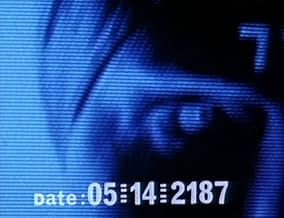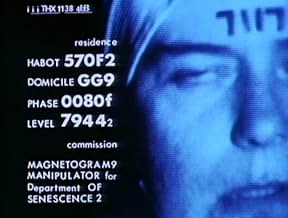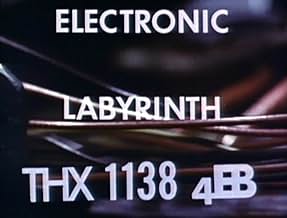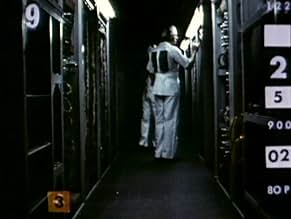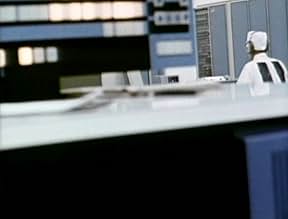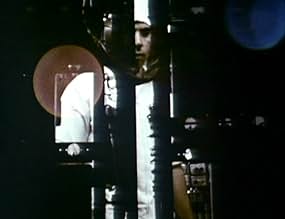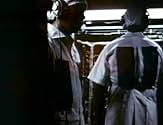Electronic Labyrinth THX 1138 4EB
- 1967
- 15m
IMDb RATING
6.2/10
2.8K
YOUR RATING
While monitored and pursued, a man races to escape through a futuristic labyrinth.While monitored and pursued, a man races to escape through a futuristic labyrinth.While monitored and pursued, a man races to escape through a futuristic labyrinth.
- Awards
- 1 win total
- Director
- Writers
- All cast & crew
- Production, box office & more at IMDbPro
6.22.8K
1
2
3
4
5
6
7
8
9
10
Featured reviews
Eyewitness account of THX becoming a feature from the short.
The film departments of UCLA and Southern California University had an annual film competition for students from both schools at a time when they and New York University were about the only schools in the country offering a degree in cinema. In 1967, I attended the showing at UCLA's Royce Hall, and George Lucas's THX-1138 was a standout work among many very good ones. Not only was it the audience's favorite, but the judges awarded it best picture. Lucas was called to the podium to accept his award. He seemed nervous and shy at the microphone, but then startled as he was interrupted at the microphone, apparently a surprise to all on stage, by a lawyer from Warner Brothers who announced that Warners was offering whoever won the competition the opportunity to turn it into a feature. That was of course George. It seemed an eternity while he stood speechless, mouth open. Warners already had the young Francis Ford Coppola under contract, so they assigned him as producer to George. I then saw the resulting feature "THX 1138" in 1971 at a theater in Hollywood. It was not great commercial success, but as we all know, the success of the George Lucas career is legendary.
An Important Short for Lucas
Electronic Labyrinth THX 1138 4EB (1967)
*** (out of 4)
This short film from writer-director George Lucas was certainly the most important one he ever made for a number of reasons. For one, it got some national attention, which also meant critics were aware of his name. For two, it led to him meeting Steven Spielberg and we know what happened from there. And thirdly, the film would eventually be turned into a feature.
The story is pretty simple as it takes place in a futuristic world where a man (Dan Natchsheim) is trying to escape but no matter where he runs someone is monitoring him.
As of me writing this, I actually haven't seen the feature so I have no idea of knowing what Lucas changed or whatever but for the most part this here was pretty interesting. I thought the highlight was clearly the visuals since Lucas didn't have too much money to work with yet you still got the impression that you were watching something set in the future. The "story" was a bit all over the map but I guess that was to be somewhat expected and I'm sure it was expanded for the feature.
*** (out of 4)
This short film from writer-director George Lucas was certainly the most important one he ever made for a number of reasons. For one, it got some national attention, which also meant critics were aware of his name. For two, it led to him meeting Steven Spielberg and we know what happened from there. And thirdly, the film would eventually be turned into a feature.
The story is pretty simple as it takes place in a futuristic world where a man (Dan Natchsheim) is trying to escape but no matter where he runs someone is monitoring him.
As of me writing this, I actually haven't seen the feature so I have no idea of knowing what Lucas changed or whatever but for the most part this here was pretty interesting. I thought the highlight was clearly the visuals since Lucas didn't have too much money to work with yet you still got the impression that you were watching something set in the future. The "story" was a bit all over the map but I guess that was to be somewhat expected and I'm sure it was expanded for the feature.
The roots of Lucas
While monitored and pursued, a man races to escape through a futuristic labyrinth.
Lucas had had an idea for a long time "based on the concept that we live in the future and that you could make a futuristic film using existing stuff". Fellow USC students Matthew Robbins and Walter Murch had a similar idea which Robbins developed into a short treatment, but Robbins and Murch lost interest in the idea, whereas Lucas was keen to persist.
Because of the USC's Navy connection, Lucas was able to access filming locations which would not otherwise have been available to him: the USC computer center, a parking lot at UCLA, the Los Angeles International Airport, and the Van Nuys Airport. Much of the filming was done at night, with some at weekends.
This film's value is in the fact it is a root. By itself, it is a very good student film, but still just that: a short student film. But we know what came of this. It turned into a feature-length film, it caught the attention of Steven Spielberg, and soon we had "Star Wars" and "Indiana Jones". Without this, we would have none of that, and Harrison Ford would be unemployed.
Lucas had had an idea for a long time "based on the concept that we live in the future and that you could make a futuristic film using existing stuff". Fellow USC students Matthew Robbins and Walter Murch had a similar idea which Robbins developed into a short treatment, but Robbins and Murch lost interest in the idea, whereas Lucas was keen to persist.
Because of the USC's Navy connection, Lucas was able to access filming locations which would not otherwise have been available to him: the USC computer center, a parking lot at UCLA, the Los Angeles International Airport, and the Van Nuys Airport. Much of the filming was done at night, with some at weekends.
This film's value is in the fact it is a root. By itself, it is a very good student film, but still just that: a short student film. But we know what came of this. It turned into a feature-length film, it caught the attention of Steven Spielberg, and soon we had "Star Wars" and "Indiana Jones". Without this, we would have none of that, and Harrison Ford would be unemployed.
For a Student Film Very Advanced
Although very little happens in terms of action in George Lucas's best-remembered student film "Electronic Labyringth THX 1138 4EB", there is already plenty to be admired in the visual look alone, considering the assumed small budget they had to work with at the USC. As in all of Lucas's early shorts, the film is very well-made with lots of good craft on display: the locations and costumes, while not overly elaborate, give enough of an atmosphere to suggest an otherworldly environment. The editing is skillful as well, being an almost abstract mishmash of shots and snippets of audio which add to the intensity of the action a little, although it certainly doesn't possess the type of intensity Hollywood would make use of. That aside, the plot itself is rather skimpy and carries plenty of repetition in the images and soundtrack; to expect a greater narrative would be admittedly absurd for fifteen minutes, yet the fact that Lucas took even that long to convey what plot he had shifts the focus to the atmosphere and setting built into it, rather than specifically the plot.
The context of the story is rather unclear, although it is made more interesting simply because we are left to decipher what is happening. The film seems to be occurring in a Dystopian setting as the likes of George Orwell would come up with - a time when the higher powers have taken over, enslaving and ruling over those below them with an iron fist. In this version, the setting is an Electronic Labyrinth in a presumed future when technology has taken over to control the lives of others. The film follows a man, given the designated number 1138, as he attempts to do the unspeakable - escape the slavery of technology, running through shiny white hallways to make it out before he is destroyed by his oppressors. With consistent intercoms blaring instructions on how to stop him mixed with security cam footage and scenes of men in headsets pulling switches, the film's atmosphere is a unique one, repetitive yet oddly surreal, with enough creativity to the settings and costumes to make give it a futuristic feel. The unanswered questions are many, yet they add to the experience - so much so that I doubt I would benefit much if at all from seeing Lucas's 1971 feature film "THX 1138" which elaborates on things. Little plot definitely, yet enough to play with the viewer's mind while simultaneously giving clues through a well-built environment. Certainly remarkable for a student's work, technically and analytically speaking.
The context of the story is rather unclear, although it is made more interesting simply because we are left to decipher what is happening. The film seems to be occurring in a Dystopian setting as the likes of George Orwell would come up with - a time when the higher powers have taken over, enslaving and ruling over those below them with an iron fist. In this version, the setting is an Electronic Labyrinth in a presumed future when technology has taken over to control the lives of others. The film follows a man, given the designated number 1138, as he attempts to do the unspeakable - escape the slavery of technology, running through shiny white hallways to make it out before he is destroyed by his oppressors. With consistent intercoms blaring instructions on how to stop him mixed with security cam footage and scenes of men in headsets pulling switches, the film's atmosphere is a unique one, repetitive yet oddly surreal, with enough creativity to the settings and costumes to make give it a futuristic feel. The unanswered questions are many, yet they add to the experience - so much so that I doubt I would benefit much if at all from seeing Lucas's 1971 feature film "THX 1138" which elaborates on things. Little plot definitely, yet enough to play with the viewer's mind while simultaneously giving clues through a well-built environment. Certainly remarkable for a student's work, technically and analytically speaking.
Without this, no "STAR WARS"
George Lucas developed this film during his days in film school. It impressed his teachers and eventually gave him the courage to make "THX 1138," a full-length spin-off which was his theatrical debut and featured the talents of Robert Duvall and Donald Pleasence.
This was the basis for that spin-off, which is much shorter and doesn't feature any of the complicated themes of the semi-remake. Personally I feel the remake is far superior because of its advanced storytelling, visuals, acting, and love story, but that's just me (and I have a feeling most people probably like the remake better, too, but...).
The point remains that without this, George Lucas might never have impressed anyone. He might never have made "THX 1138." He might never have made "American Graffiti," and there would be no "Star Wars" because he wouldn't have convinced anyone to lend him the money.
There would be no THX sound on DVDs. There would be no ILM. There would be no Indiana Jones, no Luke Skywalker, nothing.
Hard to imagine, isn't it? All because of one small 15-minute, cheaply-produced short film...
This was the basis for that spin-off, which is much shorter and doesn't feature any of the complicated themes of the semi-remake. Personally I feel the remake is far superior because of its advanced storytelling, visuals, acting, and love story, but that's just me (and I have a feeling most people probably like the remake better, too, but...).
The point remains that without this, George Lucas might never have impressed anyone. He might never have made "THX 1138." He might never have made "American Graffiti," and there would be no "Star Wars" because he wouldn't have convinced anyone to lend him the money.
There would be no THX sound on DVDs. There would be no ILM. There would be no Indiana Jones, no Luke Skywalker, nothing.
Hard to imagine, isn't it? All because of one small 15-minute, cheaply-produced short film...
Did you know
- TriviaThe "EB" referred to in the title means "earth born" according to the original script writer.
- GoofsDuring the credits where George Lucas is mentioned as the director, a piece of transparent tape is visible on the left side of the screen.
- ConnectionsFeatured in Omnibus: George Lucas - Flying Solo (1997)
Details
Contribute to this page
Suggest an edit or add missing content

